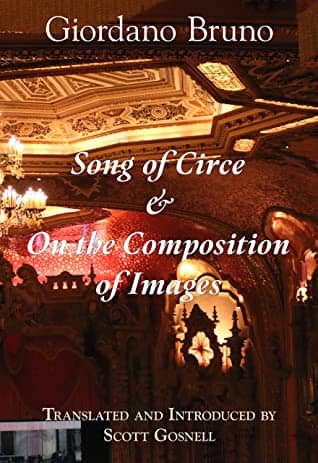Podcast: Download
Subscribe: Apple Podcasts | RSS
 Giordano Bruno wrote many fine books about the art of memory. Sadly, most of them were unavailable in English for the longest time.
Giordano Bruno wrote many fine books about the art of memory. Sadly, most of them were unavailable in English for the longest time.
Things are different now.
My guest today, Scott Gosnell, is the man to thank.
He’s spent the better part of a decade translating Bruno’s books for modern English readers. The latest release in a very fine series is Song of Circe and On the Composition of Images.
Scott is also the CEO of Windcastle Venture Consulting, a public speaker, part-time college lecturer and the author of Startup Geometry.
In our conversation today, we talk about Bruno’s enduring importance for students of mnemonics. We draw out the core ideas of balance and how you can craft a relationship between imagination and memory and get the most out of Bruno’s theory of confabulation.
We also discuss Bruno’s techniques for the Memory Palace and just how advanced his approach was for his time. Thanks to Scott’s work, these “next level” approaches are even more relatable for the here and now.
So if memory techniques have you intrigued, but you want more, this episode is for you.
Or if you’re having trouble fitting into the mold of how you “should” be committing complex information to memory, you’re about to find encouragement.
Or if you’re seeking a fresh start along your career path and you’re overwhelmed by a lot of material to learn…
Why not give the advice of a “heretic” a try?
Want to know more? Just press play above and to learn more about:
- The dual-role of student and teacher in academia…and the need for both
- The reason learning language out of necessity, not desire, can be of greatest motivation
- How variants of singular truth and dual, or even multiple, modalities can exist in harmony, and what this means for committing that “truth” to memory
- Bruno’s philosophy of a three-level universe (and how it’s even more relevant today)
- Why organization is subjective, and how you can make it work for you, even if to someone else it looks like a “jumble sale”
- The differences between copying and composition, and the reason the latter can be both more beneficial and easier
- Why memorization is not always a perfect recollection, but instead a simplified reimagination (and why it’s perfectly natural!)
- Why memory benefits both judgement and decision making
- How we simply break down Bruno’s ideas of subject, abject, and intention, to easily incorporate them into memory work
- The proven method for describing philosophical ideas – where, if we’re honest, we all can get stuck trying to memorize them
- Why Hermeticism is so attractive, especially to students of memory
- The Clavis Magna, perhaps Bruno’s greatest mystery
Further Resources on the web, this podcast, and the MMM Blog:
Bottlerocket Science – Scott’s blog and his own podcast
The Last Samurai by Helen DeWitt – referenced in this podcast
Scott Gosnell Talks About Giordano Bruno – our previous interview
John Michael Green on Giordano Bruno, Memory, and Time
More Memory Palace Books You Should Read
The Art of Memory Playlist on YouTube
Related Posts
- Scott Gosnell Talks About Giordano Bruno
Giordano Bruno may well be the most sophisticated Memorizer in all of history.
- John Michael Greer On Giordano Bruno, Memory and Time
Listen as John Michael Greer discusses his translation of Giordano Bruno's On the Shadows of…
- Scott Young On "Ultralearning" In Your Self-Directed Education Journey
Ultralearning by Scott Young shows you how to master hard skills at a greater pace.…




